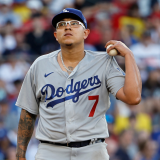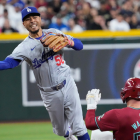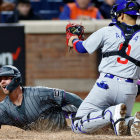
Five years into his tenure with the Philadelphia Phillies, Bryce Harper has been everything the club hoped he would be and then some. He's won an MVP, authored a .284/.395/.536 batting line, averaged 5.1 WAR per 162 games and helped the Phillies win one pennant and get to within one win of another. In other words, he's taken over as the face of the franchise. Harper is Phillies baseball.
"I love this place," Harper said during the postseason. "There's nothing like coming into (Citizens Bank Park) and playing in front of these fans. Blue collar mentality. Tough. Fighting every single day. I get chills, man. I get so fired up. I signed here for a reason, to do everything I could to bring back a trophy to this town, to (owner John Middleton), to this organization."
Harper joined the Phillies on a massive 13-year, $330 million contract that, at the time, was the largest contract in baseball. It is now "only" the eighth-largest contract ever, and, next season, Harper's $26 million salary will be tied for the 23rd largest in baseball. It'll likely rank lower than that once a few unsigned free agents receive contracts. The point is, as big as Harper's contract is, it's a bargain.
Perhaps it is no surprise then that, at the Winter Meetings in Nashville earlier this month, agent Scott Boras said Harper is seeking a contract extension that would ensure he finishes his career in Philadelphia. Such an extension would be unprecedented. Harper is five years into his 13-year contract. He won't become a free agent until after 2031, his age-38 season. No player in history has signed an extension this far away from free agency while already being under contract.
"He has a lot of goals that he wants to achieve in Philadelphia," Boras said (via ESPN). "Obviously he's a Hall of Fame type talent. He wants to keep his personal pursuits in the game there. He's been there five years, he's kind of shown them who he is, and why he's a franchise player. I think he's changed the player community, how players view Philadelphia, and so consequently, he's come in and said, 'This is something I want off my mind. I want to play well beyond the contract that I have.'"
On one hand, the Phillies could simply tell Boras, "Tell Bryce we're thrilled he's so excited to be a Phillie, but we'll pass on an extension at this time." Basically, thanks but no thanks. Honor the contract you signed and we'll do the same. On the other hand, there is a scenario in which a Harper extension could make sense for the team. A far-fetched scenario, perhaps, but a scenario nonetheless.
As it stands, an extension seems very unlikely and feels extremely ill-advised -- an extension that would begin with the player's age-39 season when he turned 31 two months ago. Still, let's break down the merits of a Harper extension, both from his perspective and the Phillies', and what an extension could even look like.
Why would Harper want an extension?
This part is easy: money. Money, and also respect. The money part is self-explanatory. As for respect, Harper is the unquestioned face of the franchise and his contract only -- "only" -- runs through age 38. Looking around the league, both Mookie Betts and Aaron Judge are both signed through their age-39 season. Elsewhere, Manny Machado's extension locks him in through age 40. Those guys all signed their current contracts after Harper, too. You can understand Harper wanting an extension that takes him through the same age as them.
Machado signed his original 10-year contract worth $300 million with the San Diego Padres a few days before Harper signed with the Phillies. Machado's contract included an opt out after Year 5, which he leveraged into an additional five years and $170 million earlier this year. Harper's contract does not include an opt out and, reportedly, that was his idea. He wanted to show his commitment to Philadelphia, something that was questioned during his free agency.
Source says Harper did not want an opt out in the contract. #Phillies.
— Joel Sherman (@Joelsherman1) February 28, 2019
The extension overtures this offseason do make it feel like Harper has a tinge of regret about not getting an opt out. Not because he wants to leave Philadelphia, but because he could have used the opt out to get an extension. An opt out is just smart business, really. Harper is already wealthy, but if there's one thing wealthy people want, it's more money. The threat of leaving would have given him a chance at an extension and thus more money. As it stands, he cannot force any discussions.
Because he doesn't have an opt out, Harper's leverage is minimal, and the little bit of leverage he does have may never be greater than it is right now. He's had five great years in Philadelphia, including helping the club win the pennant in 2022 and get to within one win of another pennant in 2023. Harper is the face of the franchise and this is the most prosperous era of Phillies baseball since the late 2000s. He has never been more important to the Phillies than he is right now. This is the time to ask for an extension.
For Harper, seeking an extension is all about adding to the bank account and ensuring he is compensated through an age commensurate with his peers. Since he doesn't have an opt out, he'll have to create leverage other ways, and playing well and helping the team make deep postseason runs the last two years is one way to create leverage. It's easy to understand why Harper would seek an extension this offseason. Every player is open to a deal that would take him into his late 30 and early 40s.
Why would the Phillies give Harper an extension?
There are two reasons for the Phillies to give Harper an extension but only one good reason. The other reason isn't a bad reason, per se, it's just meaningless. The Phillies could give Harper an extension as a show of goodwill. Essentially showing him that he's appreciated and important. That's it. Boras won't cut the Phillies favorable deals for his other clients because they extended Harper, and I doubt Harper would suddenly become disgruntled without an extension.
The one good reason for the Phillies to sign Harper to an extension is to save money. Against the competitive balance tax payroll, specifically. Each player's CBT number is the average annual value of his contract and Harper's 13-year, $330 million contract comes with a very reasonable $25.38 million annual CBT hit. That is currently the 26th-highest CBT hit in baseball, behind players like Kris Bryant ($26 million), Carlos Rodón ($27 million), and Chris Sale ($29 million) among others.
From the team's perspective, Harper's CBT number is already more than reasonable given his production, but an extension could be a way to reduce it even further. And for the Phillies, lowering Harper's CBT number would allow them to continue adding to the roster right now, while the team's World Series window is open. Why sweat 2032 or 2033 payroll when you're trying to win right now, in 2024? Giving Harper an extension that saves CBT payroll space could improve the team's World Series odds.
The Phillies finished 2023 with a $263.8 million payroll for CBT purposes. In 2022, it was $244.4 million. According to Cot's Baseball Contracts, Philadelphia has $252.8 million on the books for 2024, including arbitration projections. If the team intends to keep payroll in the same $265 million range in 2024, trimming a few million off Harper's CBT number with an extension would allow president of baseball operations Dave Dombrowski extra flexibility. Dombrowski can add to the bench, the bullpen, whatever he believes the team needs.
That, really, is the only reason the Phillies would explore an extension with Harper. Showing your franchise player respect and all that is nice, but it's a business, and both Boras and Harper know that. There is a way to lower Harper's CBT number with an extension, thus giving the team more payroll flexibility now. My guess is Harper would appreciate that. He craves a World Series ring and the more the Phillies can add to the team in the present, the better.
What could an extension look like?
If you're Boras and Harper, you use Judge and Machado as your benchmarks. Judge will be paid $40 million for his age-39 season. Machado will be paid $35 million each for his age-39 and -40 seasons. I'm going to go out on a limb here and say Boras and Harper would be agreeable to a two-year, $80 million extension. The Phillies? Not so much. That would raise Harper's CBT number, Unfortunately for them, Boras and Harper don't have the leverage to demand such a pricey extension so far into the future.
Lowering Harper's CBT number would take a little finesse and it could be accomplished several ways. Let's say the Phillies tack two years at $20 million per year onto Harper's contract. For CBT purposes, Harper has eight years and $208.3 million remaining on his contract. Add the extension and it becomes 10 years and $248.3 million, reducing his CBT number from $25.38 million to $24.83 million. That's not much savings, right? That's why finesse is required to meaningfully reduce Harper's CBT number.
Shohei Ohtani's 10-year, $700 million contract with the Los Angeles Dodgers includes massive deferrals. Massive as in he will only be paid $2 million a year for the next 10 years, then the remaining $680 million will be paid out from 2034-43. The deferrals lower the present day value of Ohtani's contract to roughly $460 million, so his luxury tax number the next 10 years will be approximately $46 million rather than $70 million. The deferrals give the Dodgers a ton of CBT payroll flexibility that they wouldn't have had otherwise.
Ohtani accepted such huge deferrals because he badly wants to win, so he did what he could to help the team. Also, Ohtani doesn't really need the money. He makes upwards of $50 million a year through endorsements, so it's not like he'll be hurting for cash while waiting for those deferred payments to kick in. The stuff about Ohtani setting a bad precedent for future free agents is overblown. The vast majority of players -- we're talking 99% or more -- would not agree to such deferrals. They are a complete non-starter.
Harper might be in that remaining 1% though. His career earnings are already in the $150 million range and that's just from his baseball contracts. He also has another $196 million coming to him through the remainder of his Phillies contract. Harper is presumably financially secure enough to sign an extension that includes heavy deferrals, lowering his CBT number significantly and thus helping Dombrowski & Co. improve the team around him.
Calculating deferrals is above my pay grade -- I was told there would be no math! -- but, fortunately, Destiny Lugardo of Phillies Nation did the leg work. Here is her example of a deferral-heavy extension for Harper:
Let's say Boras, Harper and the Phillies agree to a deal that includes:
- Three additional years added to the 8 years remaining and $55 million total guaranteed added to the $208,307,696 left, making it an 11-year, $263.31 million deal without deferrals.
- The $55 million added is deferred interest free and paid out in $5 million installments over 11 years from 2035 to 2046.
Using the 4.43% discounting rate used for all agreements signed this offseason, the five million per year added to Harper's deal would have a present value of $3,103,787. The total average annual value of the deal, the number that counts towards the luxury tax, would be $22,040,850.27. His annual tax hit would include $18,937,063.27 of yearly salary and $3,103,787 of deferred compensation.
In English, that's a three-year extension worth $55 million, taking Harper through his age-41 season. The entire $55 million is then deferred without interest (like Ohtani's deferrals) until after Harper's contract expires. Such an extension would reduce Harper's CBT annual number from $25.38 million to just north of $22 million, saving the Phillies more than $3 million per year. That's not a ton of savings -- $3 million buys you a backup catcher or an OK-ish middle reliever these days -- but every little bit counts.
If anything, this shows just how tricky it will be to find an extension that works for the Phillies, let alone for Boras and Harper. The only reason for the team to give Harper an extension is to create more financial flexibility now, and the example above requires making deferred payments through 2046 just to save a little more than $3 million against the CBT. Is it worth it? Maybe it is. Why sweat deferred payments from 2035-46? Little green aliens could come down and capture us all before then.
Unless owner John Middleton is feeling generous, giving Harper a market rate extension -- Judge and Machado money through his age 39-40 seasons -- doesn't make any sense for the Phillies. It doesn't help them create CBT payroll flexibility and it's not like the goodwill with Boras is worth much. Without an opt out, Boras and Harper simply do not have the leverage to demand Judge and Machado money on an extension. Being the face of the franchise matters, for sure, but that alone isn't enough.
To get an extension, Boras and Harper will have to take a discount and/or deferrals, which the Phillies could then use to create CBT payroll flexibility. That's really the only way this works and, honestly, it would be a win-win. The Phillies would create CBT payroll room to help build out the roster, while also saying they've Harper locked up for the rest of his career. Meanwhile, Harper gets more money while being able to say he's committed to Philadelphia. A Harper extension may be unlikely, but it's not as completely crazy as it may seem.
"Bryce has certainly expressed to them that he wants to end his career in Philadelphia," Boras said (via ESPN). "I've certainly told Dave, I think Bryce is a franchise player. He came there for the fans. Apart from my advice, he goes, 'I just want to go and make sure I can recruit players in Philadelphia, let the fans in Philadelphia know that I'm going to be there for the duration, that I am committed.'"
























